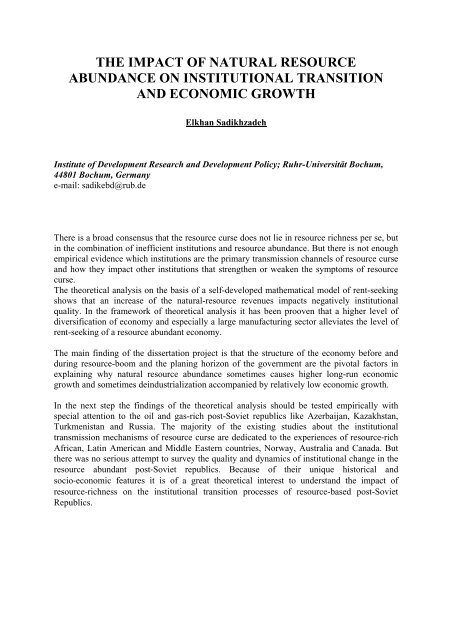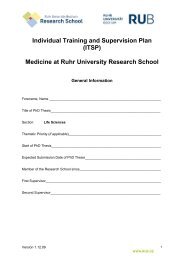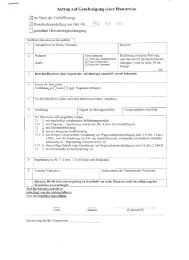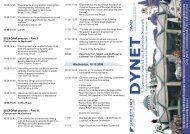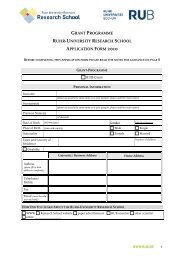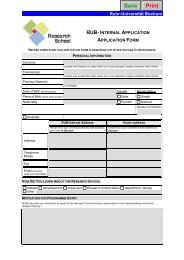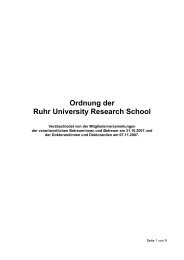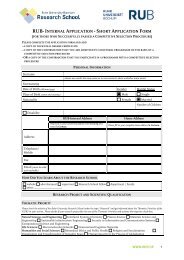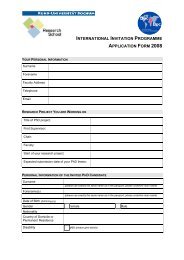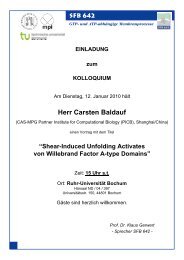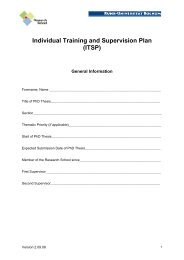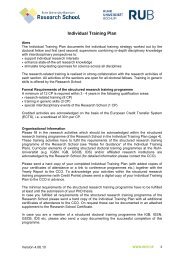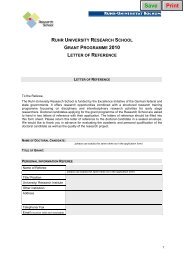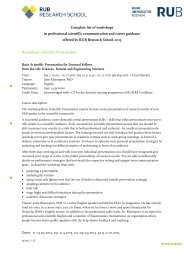Section Days abstract book 2010.indd - RUB Research School ...
Section Days abstract book 2010.indd - RUB Research School ...
Section Days abstract book 2010.indd - RUB Research School ...
Create successful ePaper yourself
Turn your PDF publications into a flip-book with our unique Google optimized e-Paper software.
THE IMPACT OF NATURAL RESOURCE<br />
ABUNDANCE ON INSTITUTIONAL TRANSITION<br />
AND ECONOMIC GROWTH<br />
Elkhan Sadikhzadeh<br />
Institute of Development <strong>Research</strong> and Development Policy; Ruhr-Universität Bochum,<br />
44801 Bochum, Germany<br />
e-mail: sadikebd@rub.de<br />
There is a broad consensus that the resource curse does not lie in resource richness per se, but<br />
in the combination of inefficient institutions and resource abundance. But there is not enough<br />
empirical evidence which institutions are the primary transmission channels of resource curse<br />
and how they impact other institutions that strengthen or weaken the symptoms of resource<br />
curse.<br />
The theoretical analysis on the basis of a self-developed mathematical model of rent-seeking<br />
shows that an increase of the natural-resource revenues impacts negatively institutional<br />
quality. In the framework of theoretical analysis it has been prooven that a higher level of<br />
diversification of economy and especially a large manufacturing sector alleviates the level of<br />
rent-seeking of a resource abundant economy.<br />
The main finding of the dissertation project is that the structure of the economy before and<br />
during resource-boom and the planing horizon of the government are the pivotal factors in<br />
explaining why natural resource abundance sometimes causes higher long-run economic<br />
growth and sometimes deindustrialization accompanied by relatively low economic growth.<br />
In the next step the findings of the theoretical analysis should be tested empirically with<br />
special attention to the oil and gas-rich post-Soviet republics like Azerbaijan, Kazakhstan,<br />
Turkmenistan and Russia. The majority of the existing studies about the institutional<br />
transmission mechanisms of resource curse are dedicated to the experiences of resource‐rich<br />
African, Latin American and Middle Eastern countries, Norway, Australia and Canada. But<br />
there was no serious attempt to survey the quality and dynamics of institutional change in the<br />
resource abundant post‐Soviet republics. Because of their unique historical and<br />
socio‐economic features it is of a great theoretical interest to understand the impact of<br />
resource‐richness on the institutional transition processes of resource-based post-Soviet<br />
Republics.


